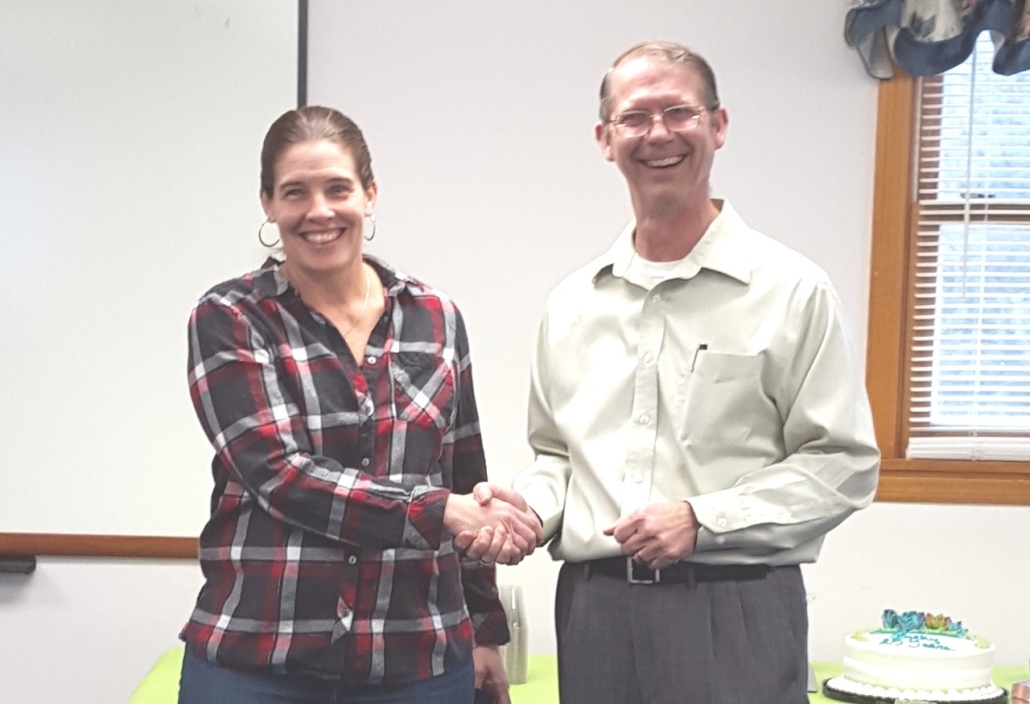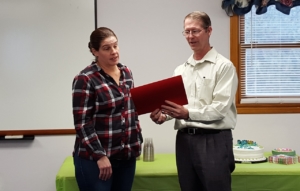
China town clerk Becky Hapgood, left, is congratulated by town manager Dennis Heath on the occasion of her 25 years of service to the town. (Photo by Roland D. Hallee)
It was 25 years ago – 1994: when O.J. Simpson led police on a slow speed chase in his white Ford Bronco, Major League baseball canceled the entire season due to a strike, Lisa Marie Presley married Michael Jackson, The Shawshank Redemption was the top film, Bryan Adams and Rod Stewart topped the pop charts, Law and Order was the number one television show, Bill Clinton was president, Robert Kraft bought the New England Patriots – and Becky Hapgood began her working career at the China Town Office.
Becky was honored at a reception at the China Town Office on Friday, February 8, by the office staff and town employees. She looked somewhat surprised, but not completely. “I noticed a lot of whispering going on around the office,” she said. “Especially this morning when they couldn’t wait to leave a meeting we were holding.”
Becky started working at the town office on February 2, 1994. “Although I didn’t like politics, and still don’t, I was working at BACK’s dairy bar, owned by my parents, and having just graduated from Thomas College with a bachelor of science degree in business management, I wanted to stay local, and find something year-round and full-time,” Becky remembers. A position opened at the town office, so she applied for it. She had also worked short stints at The South China Inn and Farrington’s Clothing Store.
“I learned how important it was to provide exceptional customer service, and loved the interaction with customers,” she added.
Becky succeeded Debra Fischer as the town clerk. She oversees a staff of five at the town office, deputies Kelly Grotton, Jennifer Chamberlain, Julie Finley, Kayla Krause and Tracy Cunningham.
Throughout the 25 years, Becky has worked with three town managers, Dennis Heath, Dan L’Heureux and Gary Brown.

China Town Manager Dennis Heath presents Becky Hapgood with a 25-year certificate. (Photo by Roland D. Hallee)
“Becky’s 25 years of service is a testament to her devotion to the people of China,” said Town Manager Dennis Heath. “The reputation of the town office has grown and been positive in large part to the relationships she has forged over her decades of service.”
Over a 25-year period, many things change. “Technology,” said Becky. “Information is at our finger tips. Computers enhance our ability to provide services to our residents.”
“We are required to attend certain trainings throughout the year,” commented Kelly Grotton, deputy town clerk. “Anytime Becky has the opportunity to meet new clerks she always offers to be a mentor if they have difficulty wading through all the aspects of the town clerk world.”
Becky’s dedication to the job is obvious in her achievements. She is a lifetime certified clerk of Maine, and was awarded as the Maine Town and City Clerk’s Association clerk of the year in 2015.
“One thing about her job that I don’t think people think about,” Grotton continues, “is how many different sets of laws and guidelines we have to know and follow. Most of what we do is set by law. Elections, motor vehicle registration, fishing and hunting licenses, and vital statistics (births, deaths, marriages, etc.) are a few of the state agencies to whom we have to answer.” To that list you can add tax collection, the lien process, payroll, accounts payable and all the laws associated with those.
Former selectman Neil Farrington added, “Becky and I have worked together for over 14 years. She was the person I would go to when asking for advice on local government policy and guidance. The town is very fortunate to have her as our town clerk.” Then he quipped, “I believe she created the phrase, ‘Neil alert,’ whenever I came into the town office.”
Becky has become a very much sought after member of the town office staff. “Several years ago, it was decided that she should have a wall because as her job has evolved over the years, much of what she does is better done with less interruption,” Grotton said. “The concept is good but didn’t work as expected. People will come in, look around and ask, ‘Where’s Becky?’ She will have to poke her head out to reassure them that she is right there.”
“She is highly skilled and vastly knowledgeable in town government,” added Heath. “If she doesn’t already know the answer, it won’t take long for her to get it. We are exceptionally grateful for her and her loyal service.”
“Becky has spent more than half of her life working for the town of China,” interjected Grotton while Heath was presenting Becky with a certificate and pin during the short and informal ceremony. Cake and punch was served.
Selectman Irene Belanger echoed the sentiments of others, applauding Becky by saying, “Becky isn’t only a very effective, good clerk, but she is a good friend to people as well.”
“I am appreciative,” Becky admitted. “I really love my job, the people I work with and the townspeople. Every day is different. The residents and my work family help to make this career a pleasure.”
Grotton summed it up best: “It is sometimes hard to gather the right words, in the right order, to express what should be conveyed. Becky has always worked toward making the town of China reflect in the most positive of lights. She has always stressed customer service and professionalism – she expects it of us and she models it in all of her actions. She considers the residents as hers and looks out for their best interests (picture a mama bear). She has always gone above and beyond any normal call of duty, not for recognition, but because it is the right thing to do. I have been happy to follow her lead for all these years.”
Becky resides with her partner Richard Doe, and her son Sage Hapgood-Belanger, a senior at Erskine Academy, in South China. In her spare time, she has coached recreational soccer and school teams, founded China Community Days, and spearheads the Christmas assistance initiative through which 10-20 China families are usually given a very nice Christmas.
Reflecting back to 1994 and the years since, Becky shares her experience: “I didn’t know what the job would entail when I started working for the town, but quickly fell in love with the job and the ability to help people. I enjoy meeting new residents that quickly become friends. I want our town office to be the best in the state.”







